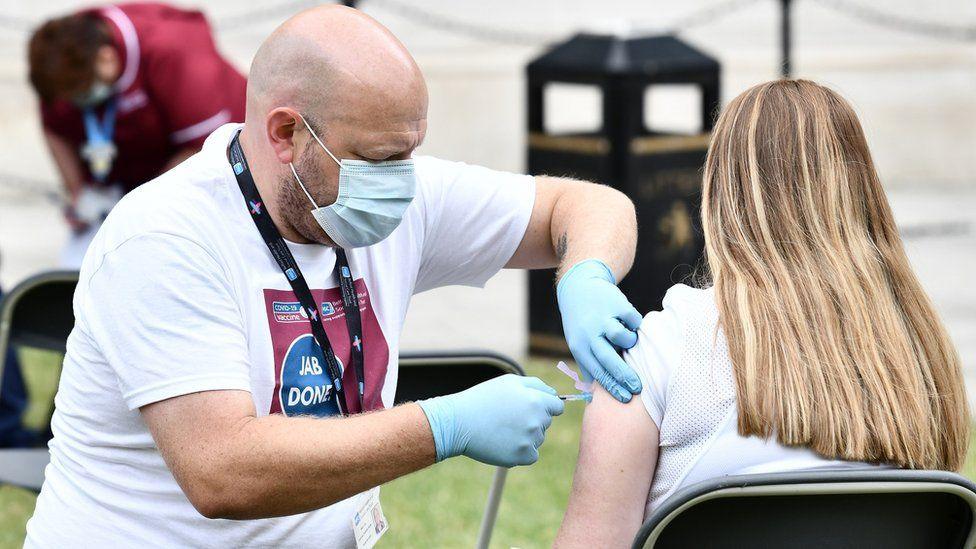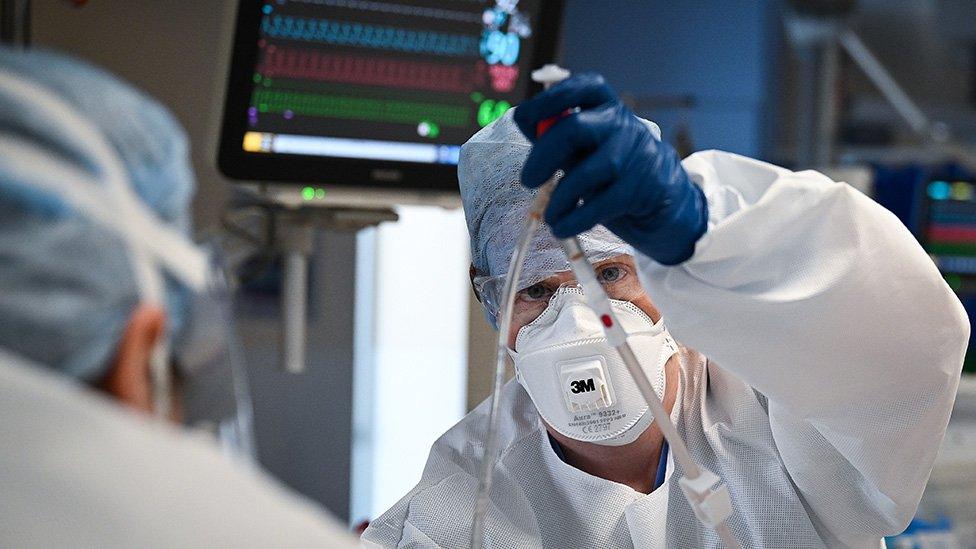Covid-19: Cancer surgery cancellations 'potentially avoidable'
- Published
- comments
A family tells how life-saving cancer surgery was cancelled twice
The cancellation of cancer surgeries due to Covid-19-related pressure on Northern Ireland's health service could have been avoided, the Royal College of Surgeons (RCS) has said.
At the end of July a number of health trusts cancelled surgeries.
But the RCS has told BBC News NI that its proposals to stop surgeries being cancelled had not been implemented.
The pressures on the system were blamed partly on people not getting vaccinated for Covid-19.
Officials have said that about 60% of Covid-19 patients in Northern Ireland hospitals have not been vaccinated.
On Monday, the deputy chairwoman of the British Medical Association (BMA) in Northern Ireland said vaccination complacency was also contributing to the number of Covid-19-related deaths.
Thirteen deaths linked to coronavirus were recorded on Saturday and Sunday and another 2,249 people tested positive.
A further five deaths and 872 positive cases were recorded on Monday.
'Big increase in Covid-19 patients'
As well as cancer treatments, some life-saving kidney transplants could not go ahead at the weekend because not enough nurses were available to support surgeons.
The Belfast Health Trust said it had apologised to all patients whose cancer surgery had been cancelled and it was "doing all we can" to reschedule the operations as quickly as possible.
There had been a "considerable increase" in the number of patients with Covid-19 being admitted to hospital intensive care units (ICU) in recent weeks, said the trust.
"This is a situation that is potentially avoidable," says Robin Adair of the RCS
"We have taken the difficult decision to postpone a small number of surgeries to create capacity within our staffing teams in theatres, who have the appropriate critical care skillsets, to assist in ICU at this very challenging time," it added.
"This decision was taken as a last resort and was certainly not taken lightly."
Robin Adair of the Royal College of Surgeons said the cancelled surgeries were regrettable and potentially avoidable.
He told BBC News NI he had hoped a system of "Covid-light" facilities would have been introduced, where operations, elective surgeries and cancer surgeries could have been kept running even if the number of coronavirus cases rose.
But he added: "They haven't been implemented in the way we would like at this stage.
"This is a situation that is potentially avoidable despite the current upsurge in Covid problems.
"We have made robust representation to the Department of Health, to the healthcare trusts and suggested plans that we think should have avoided this situation.
"But unfortunately the situation has once again recurred."
'Can't-be-bothered attitude'
Dr Frances O'Hagan, deputy chairwoman of the BMA in Northern Ireland, said there was an "I can't be bothered" attitude towards getting vaccinated for Covid-19 among some people.
She said some were hesitant about getting a vaccine and while others had an attitude of: "I'll get around to it next week or whatever."
The latest figures show that 61.4% of those aged 18 to 29, external have received a vaccine, with uptake in other age groups significantly higher.
Dr O'Hagan said vaccination was key to curbing the transmission of the virus.
She said: "We still have 1,000 cases per day at the minute, that still will mean a translation into, unfortunately, people who are unwell and people who will need admitted to hospital in the next two or three weeks - this has not gone away".


It is 18 months since the start of the coronavirus pandemic and despite all the signs it seems the health trusts continue to deal with problems as they arise rather than planning strategically to avoid them.
Members of the Royal College of Surgeons are at the heart of what's happening.
They see first-hand the consequences of what happens when time-dependent surgery is cancelled.
In May the RCS said it was crucial that surgical services in Northern Ireland were not "stood down again".
But in less than three months that is exactly what has happened.
Belfast City Hospital has been turned into a Covid-19 intensive care unit again instead of providing care for cancer patients.
To help, the RCS produced an action plan called 10 Steps Not 10 Years - while it is early days, the college has said little has been implemented.
In the past decade numerous reports have highlighted the lack of planning and forward thinking within the health system.
Official reaction to those reports is usually that lessons will be learned.
Sadly it seems that has not happened yet.

Health Minister Robin Swann said the weekend's coronavirus figures were a "stark reminder of the devastating impact that this pandemic can have".
Dr Tom Black, the BMA's Northern Ireland chairman, told BBC Radio Foyle that younger people were putting themselves at an unnecessary risk by not getting vaccinated.
"Older people understand what vaccinations are for because they have seen the alternative," he said.

First doses of the vaccine are now being administered at pharmacies and pop-up clinics
"When I was a young doctor I used to deal with two or three cases of meningitis every week - the older folk know if you get your vaccination you don't get meningitis.
"I think younger folk have to some extent been protected, they haven't had that exposure, that experience of severe illness due to a lack of vaccination.
"There is a lesson to be learned - you need your vaccine to protect yourself. If you don't have it you will be at risk."
Saturday was the last day to get a first dose of a Covid jab at Northern Ireland's mass vaccination centres.
The vaccination programme is continuing and first doses are available at pop-up clinics and pharmacies.
As of Monday a total of 2,267,414 vaccines had been given in Northern Ireland, made up of 1,219,332 first doses and 1,048,082 second doses.
Related topics
- Published1 August 2021

- Published30 July 2021
